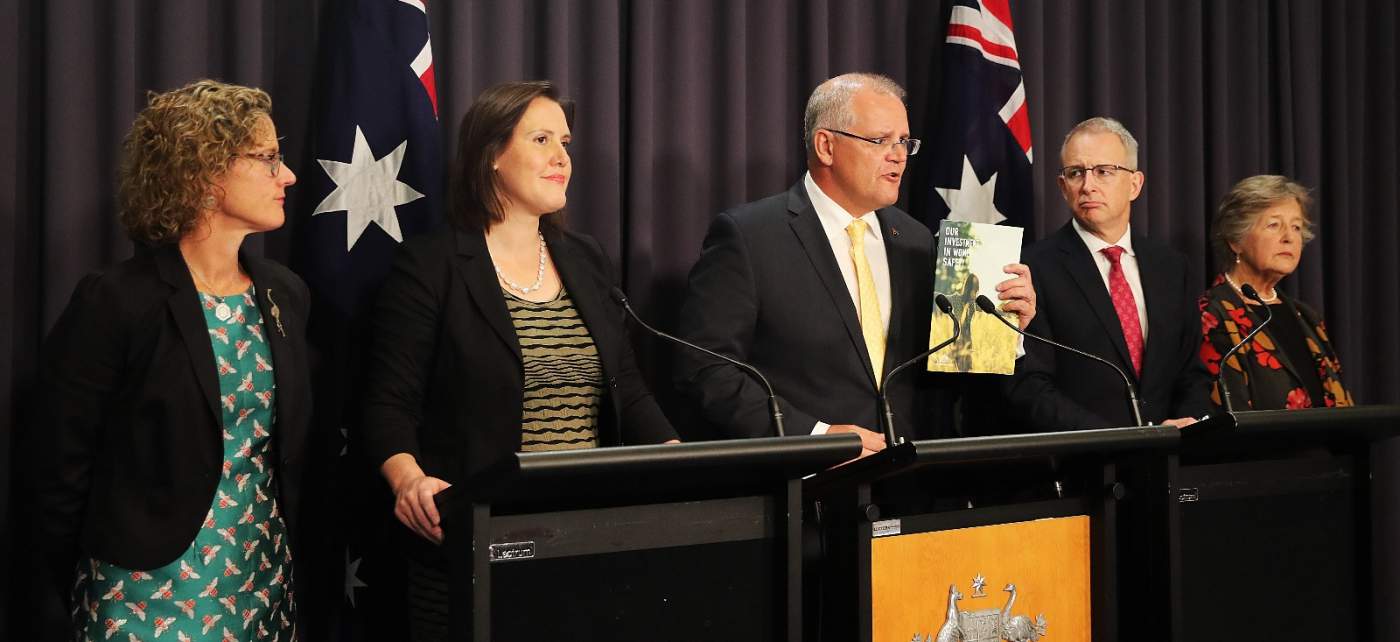A year ago today, Prime Minister Scott Morrison pledged his government would treat the battle against domestic violence as a matter of national security. A year on, new threats have taken centre stage.
The scourge of domestic violence remains, but it is disappearing from policies designed to keep Australians safe.
Speaking at the National Press Club on 11 February last year, Mr Morrison began with a familiar list of Liberal security policies: protecting our borders by beefing up national defence; deterring terrorists from carrying out attacks in Australia; fighting the menace of drugs and organised criminals by giving police “the powers that they need”.
Then, sounding more like domestic violence advocate Rosie Batty, the Prime Minister announced his government’s plan to “combat violence against women and counter the culture of disrespect toward women that can lead to that violence.”
The Liberal Party, he said, understood that national security extends “to our communities, our families, women, children and individual Australians.”
The Liberal Party, he said, understood that national security is “not just about discussing the great geopolitical tensions of our time.” Rather, it extends “to our communities, our families, women, children and individual Australians.”

Rosie Batty
Last March, the Coalition committed $78 million to help women fleeing domestic violence. And in April, it announced $328 million to the National Plan to Reduce Violence against Women and their Children, an initiative that was established in 2010.
While the federal government Commonwealth committed to funding programs, domestic violence quickly and quietly slipped off the nation’s security radar.
Following the election, the campaign against violence targeted at women was hand-balled to Anne Ruston, the Minister for Families and Social Services.
Despite the Council of Australian Government’s endorsement of the National Plan’s fourth stage last August, Ms Ruston appeared hazy about the facts about domestic violence “It’s very hard to measure something until you actually know what it is that you’re trying to measure,” she declared.
Fifty years of grassroots activism, academic research plus state and Commonwealth reports on violence within families and intimate partner relationships and we don’t yet grasp the problem?
Hard to measure? Really? Fifty years of grassroots activism, academic research plus state and Commonwealth reports on violence within families and intimate partner relationships and we don’t yet grasp the problem?
In fact, the earliest reference to domestic violence, in the context of civil disobedience, appears in Section 119 of the Constitution. The country’s earliest statesmen were concerned about a different issue – civil disorder on home soil. Yet, their framing of ‘domestic violence’ as a matter of national security is instructive.
In 1902, as MPs debated military funding, one member asserted that “complete security for life and capital must therefore be insured … for the population existing in Australia against foreign aggression and domestic violence.”
When Senators scrapped in 1914 over the Commonwealth’s power to ensure safety and security, Senator Thomas Bakhap defined domestic violence as “an interference with any citizen in the exercise of his political, civil, social, or industrial rights as protected by other legislation.”
‘Domestic violence’ need not be shunted into the category of ‘women’s and family issues’; rather, it can be redefined as a threat to national security
While the Constitution and early debates conceived of domestic violence in terms of civil strife, the Coalition could learn from this earlier conceptualisation. In other words, ‘domestic violence’ need not be shunted into the category of ‘women’s and family issues’; rather, it can be redefined as a threat to national security.
We needn’t wait for the responsible minister to determine what the government needs to measure.
Nor do we need a definition of domestic violence that will satisfy every Australian.
After all, criticism of the vagueness of ‘home affairs’ didn’t stop the establishment of a powerful department by that name. And the passage of the National Security Legislation Amendment Bill in 2018 occurred despite objections to government overreach.

Anne Ruston
If Ms Ruston is looking for a clearer definition of domestic violence, it’s unlikely to appear in the report of the joint Parliamentary inquiry into Australia’s Family Law System. The day after the government announced its launch in September 2019, Senator Pauline Hanson, appointed the inquiry committee’s co-chair, claimed credit for it.
“I am hearing too many cases where parents are using domestic violence to stop the other parent from seeing their children … There are people out there who are nothing but liars” she claimed. By “people” Ms Hanson meant mothers.
The death toll from family and intimate partner violence provides more credible evidence that domestic violence erodes national security.
For the past decade, the annual number of domestic homicides in Australia has hovered around 100. And last year, an estimated 74 women and 27 children were killed by partners or ex-partners. Deaths from terrorism in Australia over 2019? Zero.
Unless the government thinks it has no duty to ensure the rights, safety and security of its citizens, it cannot shirk its responsibility to protect Australians from violence, foreign or domestic.
As the Prime Minister declared in his press conference, any act of violence “against a fellow Australian” is “against our very way of life and who we are.”




